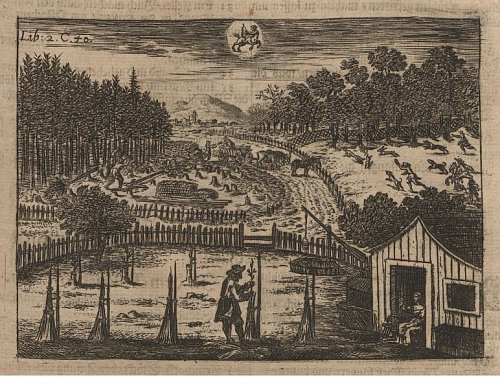ecdemolagnia
n. lustfulness when one is away from home
Language
“Belagcholly Days”

Chilly Dovebber with his boadigg blast
Dow cubs add strips the beddow add the lawd,
Eved October’s suddy days are past–
Add Subber’s gawd!
I kdow dot what it is to which I cligg
That stirs to sogg add sorrow, yet I trust
That still I sigg, but as the liddets sigg–
Because I bust.
Add dow, farewell to roses add to birds,
To larded fields and tigkligg streablets eke;
Farewell to all articulated words
I faid would speak.
Farewell, by cherished strolliggs od the sward,
Greed glades add forest shades, farewell to you;
With sorrowing heart I, wretched add forlord,
Bid you–achew!!!
— Unknown, collected in Frederic Lawrence Knowles, A Treasury of Humorous Poetry, 1902
In a Word

kumatage
n. “A bright appearance in the horizon, under the sun or moon, arising from the reflected light of these bodies from the small rippling waves on the surface of the water”
(Nathaniel Bowditch, The New American Practical Navigator, 1837)
Overstuffed Monograms
In 1960, Cambridge graduate Ron Hall announced a discovery he called Hall’s Law: “For any sufficiently large group of people the average number of initials possessed by members of that group is a direct measure of the predominant social class of the group.”
Hall’s computer analysis of the English aristocracy found that dukes averaged four names apiece, marquesses 3.96, earls 3.92, barons 3.53, baronets 3.49, viscounts 3.41, and knights 3.06. As modern examples he named John Selwyn Brooke Lloyd and Hugh Todd Naylor Gaitskell; those from the past included Admiral the Honorable Reginald Aylmer Ranfurly Plunket-Ernle-Erle-Drax, a commodore of convoys during World War II, and Major Tollemache-Tollemache de Orellana Plantagenet Tollemache-Tollemache, who was killed in World War I.
From across the sea, an American newspaper observed, “It would be interesting to know what the worthy major’s parents called him in his boyhood years.”
Limericks
A girl who weighed many an oz.
Used language I dare not pronoz.
For a fellow unkind
Pulled her chair out behind
Just to see (so he said) if she’d boz.
There once was a young cow named Zephyr.
She seemed quite an amiable hephyr.
But the farmer came near
And she kicked off his ear,
Which made him considerably dephyr.
(Thanks, Jon.)
A guy asked two jays at St. Louis
What kind of an Indian the Souis.
They said “We’re no en-
Cyclopaedia, by hen!”
Said the guy: “If you fellows St. Whouis?”
A bright little maid in St. Thomas
Discovered a suit of pajhomas.
Said the maiden: “Well, well!
What they are I can’t tell,
But I’m sure that these garments St. Mhomas.”
— Ferdinand G. Christgau
Misc
- Dorothy Parker named Alexander Woollcott’s apartment “Wit’s End.”
- Can you look at something and imagine it at the same time?
- 36850 = (36 + 8) × 50
- AGNOSTIC is an anagram of COASTING.
- “The errors of a man are what make him really lovable.” — Goethe
Roll Call
Yet more unusual names of real people. Most of these are from the collection of Leland Hilligoss of the St. Louis Public Library, via Paul Dickson, A Collector’s Compendium of Rare and Unusual, Bold and Beautiful, Odd and Whimsical Names (1986). “As far as can be determined, all of the names are real and almost all were collected in North America and the British Isles”:
- Magdalena Babblejack
- Phoebe B. Peabody Beebe
- Sibyl Bibble
- Christian Bible
- Hiawatha Cathcart
- Tensil Cheesebrew
- Adeline Dingledine
- W. French Dingler
- Ed Ek
- JoAnn Floozbonger
- E. Vercel Fuglestad
- Cashmere Funkhouser
- L.E. Vontilzer Gleaves
- Felty Goosehead
- Icy Macy Hoober
- Zola G. Hooberry
- Square Horn Jr.
- Birdie T. Hospital
- Elizabeth Hogg Ironmonger
- Mingtoy Johnson
- Epluribus Kitchen
- Varnard P. Longhibler
- Channing Manning
- Duel Maroon
- Luch V. Moga
- Otis Muckenfuss
- Lester Ouchmoody
- Loveless Pelt
- Grace Pinkapank
- Evangelist Polite
- Curt Puke
- Burger Rocket
- Melon Roof
- Goolsby Scroggins
- Norval Sleed
- Craven Tart
- Eloise Tittlekitty
- Kong Vang
- Gwendolyne Winklepleck
- Clifteen Wooters
Reversals
When Marshall Bean left the Army in 1965 after eight years’ service, he inverted his name to avoid his creditors. His new driver’s license and Social Security card read Naeb Llahsram.
Unfortunately, this fooled the Army, too, which drafted him back again in 1966. It took him more than a year to convince them he’d already served.
“All this is his own fault,” an Army spokesman told the Associated Press. “It would not have happened in the first place if he hadn’t spelled his name backwards.”
In a Word
swasivious
adj. agreeably persuasive
Jurist Diction
Onomasticist Elsdon Coles Smith keeps a file on unfortunately named law firms. His list includes Ketcham & Cheatham in New York, Wind & Wind in Chicago, Ruff & Ready in Miami, and Dilly, Dally, Doolittle & Stahl in Akron.
Novelist Paul Auster insists he encountered an Irish firm called Argue & Phibbs. (“This is a true story. If there are those who doubt me, I challenge them to visit Sligo and see for themselves if I have made it up or not.”)
And Lyle Bland’s lawyers, in Thomas Pynchon’s Gravity’s Rainbow, are Salitieri, Poore, Nash, DeBrutus & Short.
